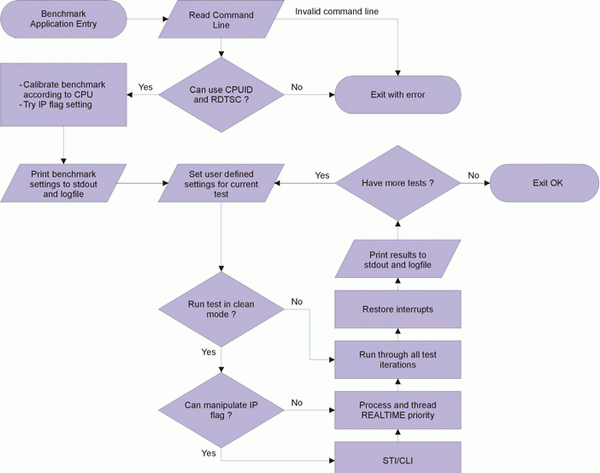Motivation
"Yesterday I was working on some code, that I think is time critical. So I wrote myself a file, a really little test project, to visualize the elapsed CPU cycles (of my life) that passed while executing the mentioned code block. As the work progressed I also wanted to see the differences, measured in cycles, between single versions, or in other words how good or bad I was in optimizing it. I wasn't quite finished with my work when I suddenly saw, that the little speed testing utility could be something, that I might share." I wrote this text some time ago. Since then my benchmark evolved...
Description

Usage
- Create new empty console project.
- Add benchmark.h and benchmark.cpp into the project.
- Add an empty .cpp file into the project. Your .cpp file should have following layout:
#include <benchmark.h>
START_BENCHMARK
SET_DESCRIPTION(formatting string)
SET_CACHING_ITERATIONS(integer)
SET_TESTING_ITERATIONS(integer)
SET_ENVIRONMENT(boolean)
BEGIN_CACHING
FINISH_CACHING
EXEBLOCK_A
EXEBLOCK_B
EVALUATE
CLOSE_BENCHMARK
- Compile the project and run the benchmark:
<appname> [[-f name | -c state | -a number | -i number] | [-h]]
f - specify log file 'name', if you omit this parameter
the default name 'benchmark.log' will be used
c - runs the tests in 'state' 0 (dirty) or 1 (clean)
if you have hard coded the 'states' of your tests,
this parameter has no effect
a - sets the global 'number' of caching iterations,
if you have hard coded this value for your tests,
this parameter has no effect
i - sets the global 'number' of testing iterations,
if you have hard coded this value for your tests,
this parameter has no effect
h - shows this help
Last Words
That's all. For further info on this topic take a look at the:
- Approximate Math Library for Intel® Streaming SIMD Extensions.
- How to optimize for the Pentium family of microprocessors, By Agner Fog, Ph.D. Copyright © 1996 - 2004.
This member has not yet provided a Biography. Assume it's interesting and varied, and probably something to do with programming.
 General
General  News
News  Suggestion
Suggestion  Question
Question  Bug
Bug  Answer
Answer  Joke
Joke  Praise
Praise  Rant
Rant  Admin
Admin 











